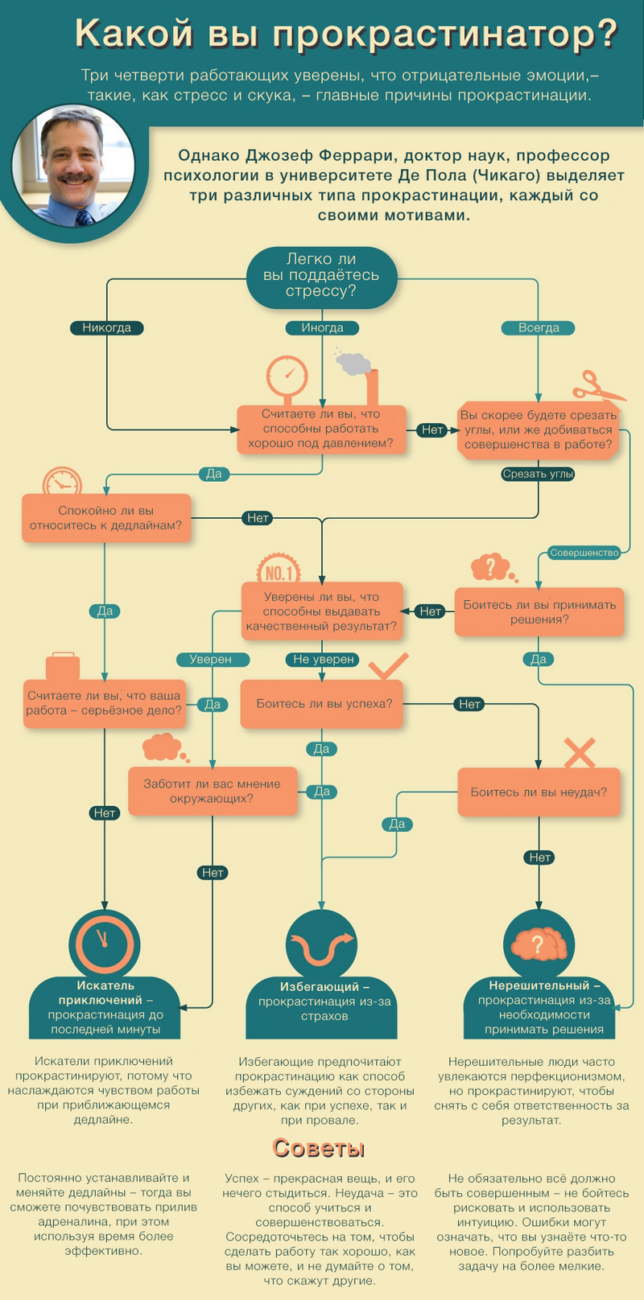To succeed in a particular case, you need to be collected, serious and responsible. Everyone knows this truth, however, each of us allows ourselves to be lazy, putting it off for later things. And the more difficult the task is, the more problematic to fulfill it on time. If you now and then are distracted by extraneous things-you, no doubt, the procrastinator, and your "laziness" has long been nicknamed by procrastination. Let's talk about how to cope with such a problem and where to get motivation in order to work efficiently.
Content
- What is procrastination
- Laziness and procrastination: distinguishing features
- Causes of procrastination
- Signs of procrastination
- Types of procrastination
- The consequences of procrastination
- How to overcome procrastination: simple tips
- How to deal with procrastination: John Perry method
- How to defeat the procrastination: several recommendations finally
What is procrastination
All -knowing Wikipedia reports that each of us can become a procrastinator completely imperceptibly for himself. This is not a disease, but rather a property of the human psyche, which at a certain stage can be a serious obstacle in conquering professional heights. Unfortunately, in Russia this outlandish diagnosis has not yet gained wide fame, so if you want to start the fight against procrastination, you will have to rely only on your own forces.

So, procrastination is an insurmountable desire to postpone important and even urgent deeds (duties) for an indefinite time, which eventually leads to life troubles. For the first time, the term “procrastination” appeared in 1977 in the scientific works of foreign authors. It was noted that a person, even being very responsible and hardworking, suddenly begins to be burdened by his work and ignores it, distracting from various little things and less important things.
Laziness and procrastination: distinguishing features
Laziness and procrastination are not synonymous, as it might seem at first glance. In fact, laziness delivers more pleasant emotions than procrastination.
Walking about Leni, a person refuses to carry out a particular job in order to relax and get pleasant emotions - to soak in bed before dinner, listen to your favorite music, chatting about anything with a friend on the phone. The procrastinator also does not solve important matters, but does not rest. Instead of work, he spends strength on extraneous things and trifles, wasting time.

Here is a simple and accessible example for understanding. You need to make a report at the conference, and you enthusiastically get to work. It takes very little time when it begins to seem to you that the cup of coffee will spur the thought process and the creation of the report will go faster. Where there is coffee, there is most often a “soothing” sandwich. During such an unscheduled snack, you must certainly check the mail and literally look into the social network for a moment. And already by watching the news tape and visiting the accounts of friends, you can even wait for lunch. The general course of thought, we hope, is clear: the procrastinator is, as it were, constantly in work, but instead of taking care of labor productivity, spraying to the little things that are not related to the matter.
To understand how to get rid of procrastination, you need to know the causes and symptoms of this misfortune.
Causes of procrastination
The procrastination virus is amazing more and more people every day. The young generation is especially suffering, which in pursuit of success wants to receive a large salary for a minimum of duties.
The main factors provoking us to use our working time are irrationally: are:
- restriction of freedom. Whenever you are limited by the temporary frames, saying that the work should be done today, you may feel depressed;
- irresponsibility and laziness. These properties are inherent to each person to varying degrees;
- self -doubt and in its competence;
- inability to rationally distribute time for work;
- the habit of postponing everything for the future (tomorrow I can handle this work much better than today).

Signs of procrastination
It is quite obvious that the procrastination takes possession of your consciousness at the moment when you feel that the work is burdensome. Performing a serious task, a person can subconsciously look for a retreat path to switch to something more pleasant. To understand whether you suffer from procrastination, you must be most frank in relation to yourself, since the problem cannot be solved if you just pretend that it is not.
So, you are a procrastinator, if you observe the following features in your behavior:
- at first you feel that the mountains are ready to turn. You are strongly tuning to do important work in the shortest possible time;
- it passes very little time, the fuse immediately goes to work, and you are looking for an occasion to move this moment;
- then you postpone the matter, not knowing exactly when you take it back again. There are a lot of excuses right there to drown out guilt and self -criticism;
- when the timing of the task becomes critical and you need to solve whether to do it or throw it, you usually give up and put up with failure. According to this algorithm, all your plans are developing when you want to do something worthwhile.
This state of things in life is obvious, therefore, almost always a person himself realizes that he has a certain problem. Psychologists recommend not to swim with the flow, but to pull yourself in your hands as quickly as possible, otherwise you can very soon turn into a spineless person who is adapted by numerous complexes and phobias.

Types of procrastination
The psychological disorder has several look:
- daily - projected on daily routine. A person is convinced that nothing terrible will happen if you transfer the implementation of relevant cases for tomorrow. As a result, a layer of dust increases, dirty things and dishes accumulate, dissatisfaction with oneself and dissatisfaction with life is growing;
- neurotic - it is scary to make decisions and carry out responsible tasks. He begins a panic if the work that needs to be done will make certain changes to the usual way of life. This type of disorder is usually affected by indecisive or infantile people who are afraid to solve even the most insignificant problems;
- academic - covers the scope of study and educational process, that is, inherent in schoolchildren and students;
- compulsive-such procrastination is combined, since a person with such a deviation not only puts off all matters for later, but also shunes to make any decisions.
The consequences of procrastination
It can be naively assumed that such a disorder is just a habit and no more. But, as you know, it is precisely the habits that largely affect the character of a person. If within a month to “kill” with unproductive work for about 1 hour daily, and then summarize this watch, it turns out that you spent more than one day in your life! In simple words, procrastination is a gradual self -destruction, a voluntary rejection of the bright, saturated with interesting events in life.
Runned forms of disorder begin to plunge a person into psychological and physical stress due to the eternal shortage of time for important matters. In such a bustle and haste, it is not always possible to fully eat, and the passion for coffee and the abuse of energy drinks inevitably leads to insomnia and nightmares.

Expressers often worry about public opinion: it is terribly inconvenient to bring people to whom they promised something, but they are not able to change. If you have become a path of procrastination, get ready for the fact that sooner or later you will have a cemetery of unrealized ideas and opportunities.
In exceptional cases, procrastination benefits. Such a statement is true for creative people working in the field of art. A creative person most often needs to postpone the project that has begun in order to “ripen” before its completion. For example, writers take a timeout in the work to better think through the plot lines of their work, and artists are distracted from work to recreate the final composition of the picture in their imagination.

How to overcome procrastination: simple tips
From the syndrome of delayed things, you need to get rid of at all costs, otherwise the disorder will only progress over time. First, honestly admit to yourself that you have problems. The treatment of procrastination will give positive results only if you very much want to get rid of it. There are no universal methods of struggle, you need to look for individual ways of recovery.
In the fight against an unpleasant personal property, you will have to remember what self -control and discipline are, and then carefully read our simple tips and think which one will work in your situation:
- If the work from which you constantly try to run away is so burdensome, maybe it's time to burn bridges and master a new kind of activity?
- Any difficult business can be divided into several stages. It is not scary to fulfill the task in parts! Having completed one stage, reward yourself with 10 minutes of rest, and then go to battle again.
- The episodic attacks of temporary procrastination are overcome with the help of positive emotions. Before performing a difficult task, allocate for yourself for some time for a hobby, which usually improves your mood, and only then take up your responsible work.
- When performing the tasks set, avoid the wording “I must” and “I must”. If you work under the oppression of responsibility, such work will not bring good results. To tune in a positive way, more often repeat to yourself as a mantra that you work exclusively for your own good and of your own free will.
- Do not neglect the daily routine - plan every minute. A clear structuring of cases will not allow to waste much time.

How to deal with procrastination: John Perry method
The teacher of the University of John Perry University has his own view of solving the problem. The author’s method is called structured procrastination. As we have already found out, the procrastinators cannot be called loafers, because they are constantly busy with something: they wipe dust, sharpen pencils or put things in order in the papers. They create this appearance of violent activity so as not to do another, more important thing.
Structured procrastination is a way of combating a disorder by drawing up a list of cases. The first items of the list are filled with paramount tasks with primary relevance, and the transfer is also completed also important, but not the most urgent matters. The trick of the method is that at the beginning of the list you need to put tasks that only seem extremely important, but in fact are not non -storage.

Due to the evasion from the tasks at the beginning of the list, the procrastinator will primarily deal with business at its end. You just need to believe in the significance of the first things in the list of affairs, but it will not be difficult for the victims of procrastination to do this, because they perfectly mastered the science of self -deception.
How to defeat the procrastination: several recommendations finally
There are actually a lot of ways to pull yourself together and find motivation for the successful work. We offer you a few more solutions to the problem:
- First of all, always take up the fulfillment of the most time -consuming and complicated business, and then take up the rest of the unpleasant “little things”. It is best to solve important problems in the morning. It’s how to take and pour on yourself a bucket of cold water - sharply, with one jerk, without thinking about how you experience this moment. So with work - take and "flow" as soon as possible.
- If you have a company of like -minded people, certainly do unpleasant work together. The result will appear earlier than you can imagine.
- Make tasks that make you be nervous, not from case to case, but in parts every day. Over time, this will become a habit, you will relax and will calmly relate to those things that have oppressed you before.
- Getting to the work, from which, according to the law of procrastination, you will want to escape after some time, think in advance that it will bring you its implementation: monetary reward, respect of colleagues, sincere gratitude of the loved one.

Learn to complete unpleasant affairs with dignity. Remember how you didn’t want to take on a difficult project, admit to yourself that you have been overcome more than once by the desire to quit everything, think about how much effort was spent in the process of work, and rejoice for yourself. It's time to relax and do something more pleasant. You are a big well done!










Comments
a couple of years ago, there was no side of metrogils from the same problem, there were no side effects ...
I’m not a fan of peeling at all, it saves from acne of metrogil, it also smoothes it ...
Great article! ...
I take the second course of the Capsules Climafite 911. The tides went very quickly. It became calmer, irritability went away and I sleep well ...
i also noticed - it is worth nervous, everything immediately affects the face. Therefore, I try to avoid conflicts and unpleasant people. Of the creams, I like Miaflow from wrinkles - smoothes not only small wrinkles ...